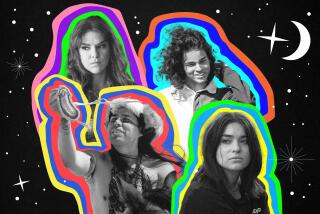Colonization, Reservations, Modernization Awaited Frontier Indians
NEW TOWN, N. D. — Long before Lewis and Clark, Marilyn Cross Hudson’s ancestors had explored every bend of the upper Missouri and hunted buffalo on every broad plain.
They were prosperous enough to offer corn, pumpkins, wheat, beans, sunflower seeds and even tobacco to the French-Canadian pathfinder Pierre la Verendrye when he “discovered” them in the 1740s in what is now western North Dakota.
Hudson, 53, is a member of the Three Affiliated Tribes--the Mandan, Hidatsa and Arikara--and is an administrator with the Bureau of Indian Affairs on the Ft. Berthold Reservation here.
Her people were the native farmers who sheltered Lewis and Clark in 1804-05, and played host to every notable white man who traveled up the Missouri River in the two centuries before North Dakota joined the union.
The white visitors brought smallpox, which nearly wiped out the hospitable Indians. Those who survived lost their free life style when homesteaders and government agents confined them to a reservation.
Noting missionary attempts to convert the Indians to Christianity, artist George Catlin, who traveled the West painting scenes of tribal life, wrote: “I love a people who keep the commandments without ever having read them or heard them preached from the pulpit.”
Theodore Roosevelt fled to North Dakota after his mother and wife died within hours of each other on Feb. 14, 1884.
“If it had not been for what I learned during the years spent in North Dakota,” he later wrote, “I would never have been President of the United States.”
Among Roosevelt’s teachers was the Hidatsa Chief Old Dog, remembered among his people as a great hunter and wise medicine man.
“Old Dog died two years before I was born, but I still remember his earth house being there,” said his granddaughter, Phyllis Old Dog Cross, Marilyn’s sister.
“My father kept his medicine bundle in the earth house and we kids were warned not to play there because it was too powerful a place,” said Cross, 59.
Now head of an eight-state mental health program for the Indian Health Service Hospital in Rapid City, S.D., Cross is one of 10 children of Old Dog’s son, Martin, who changed his name to Cross while serving in the Army in World War II. Their mother was the daughter of Norwegian immigrants.
Of the nine living Cross children, nearly all are college graduates. Many have earned master’s degrees and work with tribal Americans from Alaska to the Great Plains.
When they return to the reservation for a reunion, there is no longer an earth house, or even their town of Elbowoods, to come home to. Everything from their childhood, everything on the riverbank from the time of Lewis and Clark, was flooded when the Army Corps of Engineers built Garrison Dam in the early 1950s to prevent downstream flooding.
Raymond Cross, 40, the youngest of Martin’s children, is trying to get Congress to right the wrongs done to the 2,200 people of his tribe.
“We are still owed a hospital, irrigation water, cheaper electricity and the resources to rebuild a cohesive social and economic tribe,” said Cross, a graduate of Stanford University with a Yale law degree who recently completed a year of economics study at the John F. Kennedy School of Government at Harvard University.
“Indian people themselves must be the source for their own internal change, not the so-called do-gooders from outside,” he said.
Hardest Stereotype
Phyllis Cross, who was honored by Ladies Home Journal magazine in 1983 as the outstanding woman in South Dakota, said:
“Now the hardest stereotype I run into is a backward put-down from a strange group of white liberals who want to keep Indians on the reservation as quaint and cute. They think that unless you’re a poor, uneducated, run-down, alcoholic Indian, you’re not a real Indian.
“No one in my family fits that profile. All of us are trying to be of service to our people,” she said.
“I think Old Dog and my grandmother, Many Dances, would be proud of us.”
More to Read
Sign up for Essential California
The most important California stories and recommendations in your inbox every morning.
You may occasionally receive promotional content from the Los Angeles Times.









